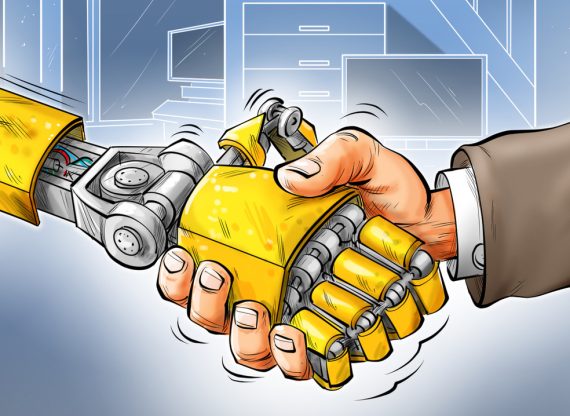Artificial intelligence will be good for workers

Montreal, October 30, 2019 – Are machines going to steal our jobs? That is the question that keeps popping up in light of the rapid progress of artificial intelligence (AI). Research shows, however, that such fears about the adverse impact of AI on employment are largely exaggerated, according to a study published today by the MEI.
“There is no doubt that artificial intelligence will transform the labour market, and we should certainly not disregard the plight of affected workers. We must keep in mind, though, that more jobs will be created than destroyed,” says Gaël Campan, Senior Associate Researcher at the MEI and co-author of the publication.
Indeed, the World Economic Forum projects that structural changes in the labour market due to AI and related technologies will have created 58 million net jobs worldwide by 2022. Moreover, current forerunners in robotization, like South Korea, Japan, and Germany, also enjoy low unemployment rates.
“AI allows less experienced or less skilled workers to be productive much faster, instead of having to learn costly skills and knowledge over years on the job,” explains the researcher. “This means improved job opportunities, which are better paid, less risky, and more gratifying.”
Nonetheless, to smooth over this transition and minimize its negative impact, proactive measures should be taken to limit job losses, and to reduce the hardships of those most likely to be affected.
“Industrialized countries must rethink their teaching and training strategies in order to better cope with a rapidly evolving environment,” says Mr. Campan. “To better prepare the workforce to the realities of automation, colleges should among other things develop closer relationships with the business community.”
The bureaucratic and regulatory burden should also be reduced in order to facilitate business creation and development, as well as personnel recruitment.
In sum, instead of worrying about the rapid development of artificial intelligence, we should welcome this opportunity. “Apocalyptic scenarios make for good science fiction films, but they are less useful when measuring economic impact! As was the case with other transformative technologies, the judicious use of artificial intelligence will give a boost to innovation and contribute to the general improvement of living standards. AI is not a threat to humanity, but an ally,” concludes Luc Vallée, Chief Economist at the MEI and co-author of the publication.
The Economic Note entitled “More and Better Jobs: Addressing AI’s Multiple Effects on Employment” was prepared by Gaël Campan, Senior Associate Researcher at the MEI, and Luc Vallée, Chief Operating Officer & Chief Economist at the MEI. This publication is available on our website.
* * *
The MEI is an independent public policy think tank. Through its publications and media appearances, the MEI stimulates debate on public policies in Quebec and across Canada by proposing reforms based on market principles and entrepreneurship.
-30-
Interview requests: Pascale Déry, Vice President, Communications and Development, MEI. Tel.: 514-273-0969 ext. 2233 / Cell: 514-502-6757 / Email: pdery@iedm.org

